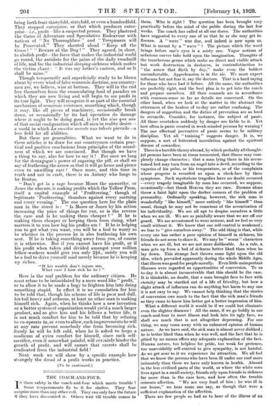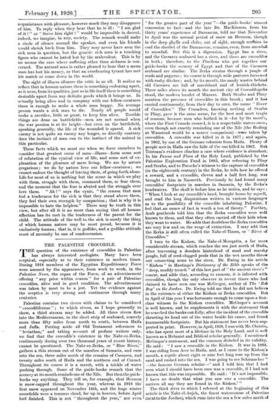THE COACH-AND-FOUR.
IS there safety in the coach-and-four which meets trouble ? Some temperaments fly to it for shelter. They fear surprise more than any other evil. They can only face the future if they have discounted it. Others wait till trouble comes to them. Who is right ? The question has been brought very practically before the mind of the public during the last few weeks. The coach has called at all our doors. The authorities have suggested to every one of us that he or she may get in- fluenza. A " wave " was due, and indeed is now upon us. What is meant by a " wave " ? The picture which the word brings before one's eyes is a misty one. Vague notions of nefarious curves take hold upon the imagination. Thoughts of the treacherous germs which make no direct and visible attack but work destruction in darkness, in contradistinction to " the arrow that flieth by day," make even the boldest uncomfortable. Apprehension is in the air. We must expect influenza but not fear it, say the doctors. That is a hard saying for those who have had it before. All the same, the authorities are probably right, and the best plan is to get into the coach and prepare ourselves. All their counsels are in accordance with common-sense so far as details are concerned. On the other hand, when we look at the matter in the abstract the utterances of the healers of to-day are rather confusing. The dangers of suggestion and the duties of prevention are so hard to reconcile. Consider, for instance, the subject of panic. All those overtaken suddenly by danger are liable to it. Yet how often is panic created in weak-minded persons by warning ? The one effectual preventive of panic seems to be military discipline. Yet all " training " suggests danger. It is, we suppose, a sort of feiterated inoculation against the spiritual disease of cowardice.
There is a horrible theory abroad, by which probably all thought- ful persons have been at times tormented, that illness may com- pletely change character ; that a man lying there in his accus- tomed bed may turn from an angel into a devil, according to the vagaries of his pulse, or his temperature, or of the complaints whose progress is recorded as upon a clock-face by these symptoms. Such mysterious tragedies have no doubt occurred —every tragedy imaginable by man has occurred, we suppose, occasionally—but thank Heaven they are rare. Dreams alone throw a faint light upon the darker corners of the problem of personality. Ordinarily speaking, however, the sick man is wonderfully " like himself," more entirely " like himself " than usual, though he may not be conscious of the accentuation of his individuality. We are all apt to despise ourselves a little when we are ill. We are so painfully aware that we are off our guard. We are accustomed to wear armour, and we feel so very small without it. We know that our self-control is weakened ; we fear to " give ourselves away." The odd thing is that, while every one has rather a poor opinion of himself in sickness, his friends do not seem to share it. We may be " worse " characters when we are ill, but we are not more dislikeable. As a rule, a man gets up from a bed of sickness better liked than when he lay down. This strange fact throws some light upon the old idea, which prevailed apparently during the whole Middle Ages, that illness was good for people morally. Even little unimportant illnesses were regarded as opportunities of conversion. To us to-day it is almost inconceivable that this should be the case. It is thinkable, no doubt, that a man brought face to face with eternity may be startled out of a life of frivolity, but how a slight attack of influenza can do anything but harm to any one it is not easy to say. We cannot help thinking that the stories of conversion owe much to the fact that the sick man's friends as they came to know him better got a better impression of him.
What a different world it would be if we could but eliminate even the slighter diseases ! All the same, if we go boldly in our coach-and-four to meet illness and look into its ugly face, we shall see much that is not altogether depressing. For one thing, we may come away with an enhanced opinion of human nature. As we have said, the sick man is almost never disliked ; he is better liked than when he was well, and the fact that he is pitied by no means offers any adequate explanation of the fact. Human nature, too helpless for pride, too weak for pretence, too unavoidably self-centred to give sympathy, is not hateful. As we get near to it we experience its attraction. We all feel that we know the persons who have been ill under our roof more intimately than those we have only known in health. Abroad in the less civilized parts of the world, or where the white man lives apart in a small society, friends rely upon friends in sickness far more than is the case here, and how often the trouble cements affection. " We are very fond of him ; he was ill in our house," we hear some one say, as though that were a sufficient explanation of the affection.
There are few people so bad as to hear of the illness of an
acquaintance with pleasure, however much they may disapprove of him. To reply when they hear that he is ill : " I am glad of it I " or " Serve him right ! " would be impossible in decent, indeed, we imagine, in any, society. The remark would make a circle of silence around the speaker, and even his friends would shrink back from him. They may never have seen the sick man in question, but the generic sick man is a touching figure who cannot be hated but by the malevolent. This is by no means the case where suffering other than sickness is con- cerned. The natural man is rather pleased to hear that a mean man has lost his money, or that an overbearing tyrant has met his match or come down in the world.
The sight of illness silences the critic in us all. It makes us reflect that in human nature there is something endearing apart, as it were, from its qualities, just as in life itself there is something desirable apart from any definite goods which it brings us. In actually being alive and in company with our fellow-creatures there is enough to make a whole man happy. No average person wants a sick man to die. Nearly all people would make a sacrifice, little or great, to keep him alive. Terrible things are done on battlefields—men are not normal when the war passion is at its height—but even on the battlefield, speaking generally, the life of the wounded is spared. A sick enemy is not quite an enemy any longer, so directly contrary does the instinct of man run to the instinct of the animal in this particular.
These facts which we must see when we force ourselves to consider that greatest curse of man—illness—form some sort of refutation of the cynical view of life, and some sort of ex- planation of the pleasure of mere living. We are by nature gregarious ; we do by nature love our fellow-creatures ; we cannot endure the thought of leaving them, of going forth alone. Life for most of us is nothing but the scene in which we play with them, struggle with them, command them, or fear them, and the moment that the fear is abated and the struggle over love them. "Au!" says the cynic, " the reason that men feel a tenderness for the sick is that they stand above them, they feel their own strength by comparison ; that is why it is impossible to hate the helpless." There may be truth in this .view, but after all it is no more than saying that all human affection has its root in the tenderness of the parent for the child. The attitude of the well to the sick is surely the thing of which human nature may be most proud, because it is exclusively human; that is, it is godlike, and a godlike attitude must of necessity be one of condescension.



































 Previous page
Previous page